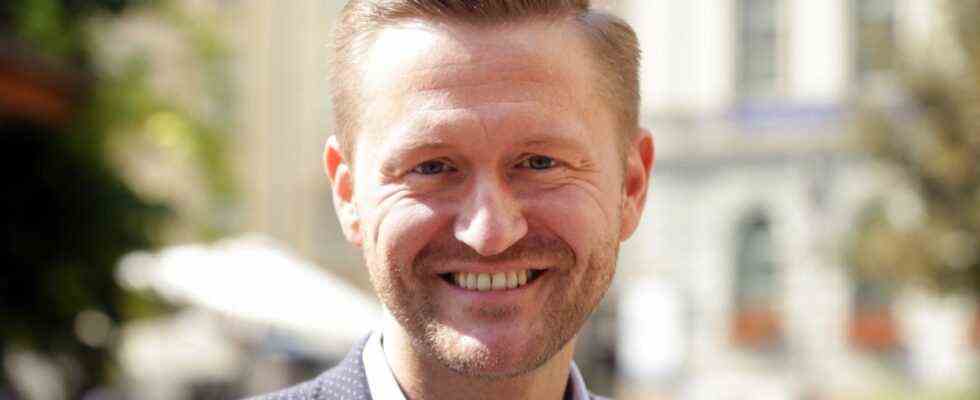If you sit with Wolfgang Stefinger in the Cafe on Wiener Platz and talk about the election campaign in the east of Munich, you quickly end up in Bangladesh. When the workers are being exploited there, you shouldn’t look the other way, you have to look carefully, and it is best to start with yourself, he says. “In the bathroom in the morning there may already be palm oil, the jeans come from Bangladesh, the coffee not from Upper Franconia either.”
Anyone who thinks that a left-wing or green do-gooder is speaking is wrong. It’s one of the CSU. Stefinger’s specialty is just not party classics like internal security or the economy, but development, education and research policy. And in this capacity he is very pleased that the supply chain law has been passed. Because that obliges the economy to take a close look at where their raw materials come from and how they are processed.
With a movement of his hand and mind, Stefinger quickly makes the jump from Bangladesh to Haidhausen again. Over there, he says, and points through the window at the market stalls on Wiener Platz, regional raw materials are on offer. He thinks that is politically appropriate and good from a culinary point of view, especially when it is offered to him at a high volume from a stand in the form of meat patties. “A nice spot in Munich,” he says. But unfortunately also one in need of renovation. Stefinger advocates that this happens with the necessary instinct. For the same goal at the Viktualienmarkt he founded his own association, the “Friends of the Viktualienmarkt”.
Stefinger tries to bring the local concerns and the big problems of the world under the hat of a representative in the east of Munich. The 36-year-old MP is not always in line with his party, but he takes this freedom and can indulge himself. The CSU empire in the east is still considered to be one of the safest in the Bundestag election in Munich, which is why Stefinger can forego protecting himself on the state list in the event of a defeat in the fight for the direct mandate.
All or nothing, that’s what he said on September 26th. Anyone who doesn’t strive for a good place on the list and therefore has to make the party good weather, “can act differently,” he says. For example, agreeing to the law on marriage for all or upsetting the economy with a supply chain law. And being “uncomfortable” more often, as Stefinger claims. He locates himself in the wing of the liberal big city CSU, which means that he sometimes has to mess with more conservative circles.
But Stefinger is used to that from his youth. He comes from Waldperlach, grew up there and was involved in church youth work, and was himself a senior administrator. There, too, he learned to discuss and how important it is to exchange different opinions. Because only those who have their own have dealt with a topic, says Stefinger. If there is a compromise in the end, it is not a sign of weakness, but of the ability to bring people together. He sees the task of the CSU as a people’s party, “as a bracket for togetherness”.
In his relationship to politics and the party, what his predecessor as a member of parliament in East Munich, Berti Frankenhauser, gave him applies: never make yourself dependent. Stefinger still has a small mandate as a lecturer at the Munich University of Applied Sciences, three block seminars per semester. There he studied business administration and later did his doctorate. Before he moved into the Bundestag for the first time as a member of parliament very early at the age of 28, he worked for a health insurance company in Hamburg. Now he lives in Waldperlach again, he thinks Berlin is good, but Munich is more worth living in. In his free time, the single politician is drawn to the mountains, on skis in winter and on foot in summer. “Just go and think about walking, that clears your head,” he says. There will be little time for this in the election campaign, even if it still feels strange to him because of Corona.
Otherwise he liked to be out and about, he says, at parties and clubs, because “you only hear something when you are sitting at the table”. But a lot is lost, and when he meets people he can listen to the question why he has not shown up for the past year and a half. “Corona,” he just says, and raises his hands in a perplexed gesture. It just didn’t work. In 2013 and 2017 he won the until then deep red Haidhausen as a liberal CSU candidate. He wants to repeat that, even if the Greens are now setting the tone there. He wants to tackle this with the topics, climate change, yes, but with innovation instead of bans. “I’m sure we can do it that way.”
Anyone who drives around in a Porsche and demands wind turbines everywhere, just not in front of their own front door, wants to “hold up the mirror”. Stefinger will try to explain this to people in the east of Munich in the coming weeks, at information stands, but also with visits to the front door. When it comes to energy, Stefinger immediately jumps off again to a hydrogen project in Morocco, funded by German development aid. Germany and Europe would not solve the problems of the future on their own, says Stefinger, but if Germany is helping, he would like to continue to get involved in the Bundestag.

